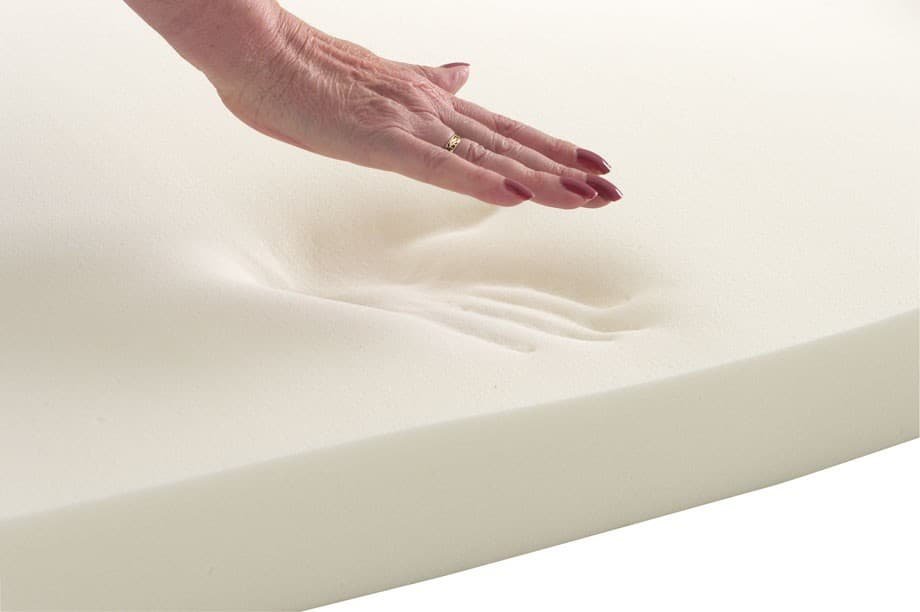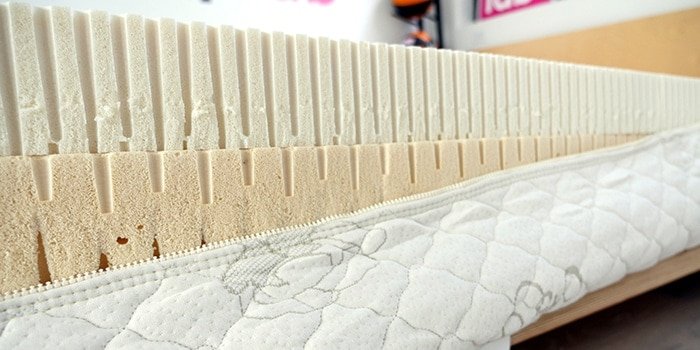Pros + Cons of Memory Foam Mattresses
The world of memory foam has taken off in recent years. More and more people are discovering the benefits of sleeping on a memory foam mattress, so these mattresses are becoming increasingly popular. However, like anything else, memory foam mattresses have pros and cons. Before you purchase one, you should know a few things to help you decide if a memory foam mattress is right for you.
What is a memory foam mattress?
NASA originally developed memory foam in the 1970s to help protect astronauts during takeoff and landing. A memory foam mattress is made of a viscoelastic and open-celled material. That means it can conform to your body’s shape while allowing air to circulate.
How is memory foam made?
Memory foam is made from polyurethane, which is a type of plastic. Manufacturers add chemicals to the polyurethane to increase its viscosity and density to make memory foam. This makes the foam more supportive and durable.
What products other than mattresses contain memory foam
Memory foam is used in various products, including pillows, toppers, and pet beds. Memory foam is also gaining popularity as a furniture material, such as sofas and chairs. Now let’s turn our attention to the pros and cons of memory foam
The pros of memory foam
- Memory foam contours to your body – Memory foam is made up of many small cells that are all interconnected. When you lie down on it, the cells push against each other and conform to your shape. This gives you the feeling of being wrapped in a comfortable, supportive cocoon.
- Memory foam doesn’t sag over time – Some mattresses start to sag after just a few years. But not memory foam. This type of mattress is designed to keep its shape for a long time, meaning you can enjoy a comfortable night’s sleep for years.
- Memory foam relieves pressure points – If you suffer from back pain, a memory foam mattress may be just what you need—the material contours to your body, supporting your spine and relieving pressure points.
- Memory foam is hypoallergenic – Memory foam is an excellent choice for people with allergies. The material is naturally resistant to dust mites, mould, and mildew. And because it doesn’t sag, there are no places for dust and other allergens to hide.
- Memory foam is temperature-sensitive – Another great thing about memory foam is that it’s temperature-sensitive. Memory foam is temperature-sensitive, which adjusts to your body temperature to keep you comfortable.
- Memory foam is available in various densities – Memory foam comes in multiple thicknesses, so you can choose the one that’s right for you. The denser the foam, the more supportive it is. That’s important because you want a mattress that will support your body.
- Memory foam reduces motion transfer – If you sleep with a partner, you know the feeling of being jolted awake when they move around in bed. But with memory foam, you don’t have to worry about that. Instead, the material absorbs movement, so you can sleep soundly even if your partner is restless.
- Memory foam is low-maintenance – Memory foam mattresses are low-maintenance. You don’t have to flip or rotate them; they don’t require special care. Just unpack them, set them up, and enjoy a good night’s sleep.
- Memory foam is durable – Memory foam is a durable material that will last for years. You don’t have to worry about it sagging or losing its shape. So, your investment in a memory foam mattress will pay off in the long run.
Cons of memory foam mattresses
- Memory foam mattresses can retain heat – One potential downside of memory foam is that it can retain heat. If you tend to sleep hot, you may find that a memory foam mattress doesn’t allow your body to breathe. As a result, you may wake up feeling sweaty and uncomfortable.
- Memory foam mattresses can be expensive – Another potential downside is that they can be costly. If you’re on a budget, you may want to look at other types of mattresses. But keep in mind that you get what you pay for with memory foam. Your investment in a memory foam mattress will pay off in the long run.
- Memory foam mattresses can be heavy – The weight of a memory foam mattress can be another downside. If you need to move your mattress up a flight of stairs, you may need help. Memory foam mattresses can also be difficult to move if you need to change rooms.
- Memory foam mattresses can emit an odour – You may notice a smell when you first unpack a memory foam mattress. This is called off-gassing, caused by the chemicals used in the manufacturing process. The good news is that the odour will dissipate over time.
- Memory foam mattresses can be too firm for some people – Some people find that memory foam mattresses are too firm. But remember that you can always add a mattress topper to make a memory foam mattress softer. If you like a soft mattress, you may want to look at other options.
- Memory foam mattresses may not be suitable for people with certain health conditions – If you suffer from back pain, you may consult your doctor before buying a memory foam mattress. The same is true if you suffer from allergies or asthma. Memory foam mattresses may not be the best option for people with these health conditions.
- Memory foam mattresses may not be suitable for pregnant people – If you’re pregnant, you may want to consult your doctor before buying a memory foam mattress. Memory foam mattresses can be hard to get out of and may not provide the support you need during pregnancy.

As you read the reviews and check out product descriptions, remember these memory foam mattress buying tips to help make your purchase easier:
- Read the fine print – When buying a memory foam mattress, reading the fine print is essential. Make sure you understand what you’re getting before you make your purchase. Pay attention to the warranty and return policy.
- Compare prices – Before buying a memory foam mattress, you’ll want to compare prices at different sites. You’ll also want to compare the prices of other brands to find the best one for you. Make sure you’re getting the best deal possible.
- Check the return policy – Know the store’s return policy before buying a memory foam mattress. Some stores may not accept returns on memory foam mattresses. If you’re not sure, call the store and ask.
- Ask about the trial period – Some stores offer a trial period for memory foam mattresses. If you’re considering a purchase, ask about the trial period. This will allow you to test the mattress and ensure it’s right.
- Get the right size – When buying a memory foam mattress, ensure you get the right size. You don’t want to end up with a mattress that’s too small or too big. Measure your bed before purchasing to ensure you get the right size.
- Consider the firmness – When buying a memory foam mattress, you’ll want to consider its firmness. Some people prefer a softer mattress, while others prefer a firmer one. Consider your preferences before you make your purchase.
- Talk to your partner about their mattress preferences – Nothing is worse than lying on a new mattress only to find out your partner hates it. So, before you purchase, talk to your partner about their mattress preferences. This will help you choose the right mattress for both of you. You may consider pairing your memory foam mattress with a memory foam pillow. You can’t have too much memory foam! If you’re looking for the ultimate comfort, consider pairing your memory foam mattress with a memory foam pillow. This will give you the best night’s sleep of your life.
So, is a memory foam mattress right for you? It depends. A memory foam mattress may be a good option if you’re looking for a comfortable, supportive mattress. However, there are some things you should keep in mind before you make your purchase. Make sure you research and read the fine print before buying. And don’t forget to ask about the trial period! The best investment you’ll ever make is in the quality of your sleep. Your mattress is one of the most critical factors in getting a good night’s sleep. A memory foam mattress can provide the support and comfort you need to get a good night’s sleep.



